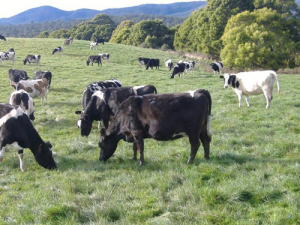Editorial: Happy days
OPINION: The year has started positively for New Zealand dairy farmers and things are likely to get better.
 Compensation issues need to be clarified in the government’s biosecurity response guide, says a new report on New Zealand’s veterinary services.
Compensation issues need to be clarified in the government’s biosecurity response guide, says a new report on New Zealand’s veterinary services.
Compensation issues need to be clarified in the government’s biosecurity response guide, says a new report on New Zealand’s veterinary services.
This includes confirming areas where people who had suffered losses would be eligible for compensation, the report says.
This applies particularly to ‘grey’ areas such as welfare slaughter in the case of a significant disease outbreak like foot and mouth disease, or for losses because of a national livestock standstill, says the report, which compares NZ’s vet services and systems against international standards.
The report is largely complimentary but has raised some recommendations.
Systems, processes and supporting logistics need to be developed for dealing with compensation claims for medium-large responses, as the current process is “very cumbersome and unworkable,” the report says.
The ‘Whole of Government Biosecurity Response’ guide also needs to be updated to outline the future integration of government – industry agreement (GIA) partners into biosecurity responses, the report says.
The report was done in late 2015 by two evaluators from the Ministry for Primary Industries (MPI) Dr Andre van Halderen (technical expert and coordinator) and Dr Erin Daldry (lead auditor); Dr Chris Morley was the industry evaluator.
The self-evaluation of the NZ veterinary services was based on the World Organisation for Animal Health (OIE) methodology.
It was released last month.
It recommends that the roles and responsibilities regarding disease preparedness, as well as agreement on who is responsible for leading what type of response, need to be clarified.
“There should also be clear criteria and cross-organisational processes for involvement in emerging disease scenarios, particularly where non-infectious diseases are involved,” it says.
In other recommendations it says the animal welfare project should be prioritised and recommendations implemented to ensure the animal welfare system (including leadership and roles and responsibilities) is clearly understood, to allow for a more strategic approach to dealing with animal welfare issues.
The report also says that after multiple mergers and restructures of MPI needs to develop a clear, comprehensive organisational chart. This should clearly outline functions, key role holders and the main areas of interaction between the different parts of the organisation.
"This will be useful for MPI staff and stakeholders. This should be widely publicised, freely available and frequently updated to ensure currency. This should help stakeholders identify and find appropriate parties in MPI."
MPI should ensure there is systematic consultation to ensure all relevant parties are consulted and all comments considered.
It also needs to be ensured that the depth of response to consultation is appropriate for the issues raised, and that adequate time is allowed when comments are requested.
The report says the access to markets via NAIT has brought about significant improvements to animal traceability.
The review of NAIT now starting is an ideal opportunity to improve the system.
The World Wide Sires National All Day Breeds Best Youth Camp Best All Rounder plaudit has become family affair, with 2026 Paramount Cup winner Holly Williams following in her sister Zara's footsteps.
DairyNZ is giving New Zealand farmers a unique opportunity to gain hands-on governance and leadership experience within the dairy sector.
Herd improvement company LIC has posted a 5.2% lift in half-year revenue, thanks to increasing demand for genetics.
According to the latest Fresh Produce Trend Report from United Fresh, 2026 will be a year where fruit and vegetables are shaped by cost pressures, rapid digital adoption, and a renewed focus on wellbeing at home.
The Roar is a highlight of the game hunting calendar in New Zealand, with thousands of hunters set to head for the hills to hunt male stags during March and April.
OPINION: The past few weeks have been tough on farms across the North Island: floods and storms have caused damage and disruption to families and businesses.

OPINION: Meanwhile, red blooded Northland politician Matua Shane Jones has provided one of the most telling quotes of the year…
OPINION: This old mutt has been around for a few years now and it seems these ‘once in 100-year’ weather…